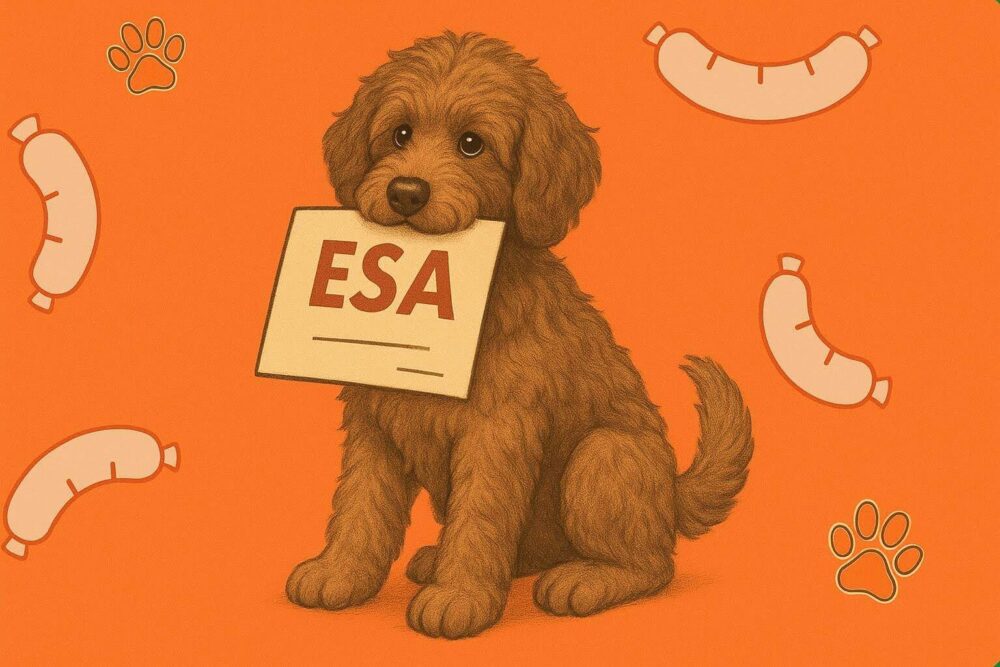Table of Contents
Fraudulent emotional support animals (ESAs) are on the rise, and this isn’t just a nuisance—it’s creating real problems for people who genuinely need their animal companions to help them cope with life’s challenges.
As landlords and businesses become increasingly skeptical, you might be scrutinized even if you have genuine ESA needs. So, how do you prove that your furry friend is truly helping, and why is it becoming so important to verify your ESA?
In this guide, we’ll explain what ESA verification means (spoiler—it’s not what some of those websites suggest) and what your (and your landlord’s) rights are when it comes to verifying your ESA documentation. We’ll also provide tips on getting legitimate ESA paperwork easily and quickly.
What Makes an Animal an ESA?
Not everyone who loves cuddling their cute pet automatically qualifies to have an ESA. Under the Fair Housing Act (FHA)—the primary law that regulates ESAs—your animal buddy is only recognized as an emotional support animal when paired with an ESA letter from a licensed mental health professional (LMHP).
This letter is a formal document stating that you have a mental health condition and that your animal helps ease the symptoms. The FHA gives ESAs special privileges over regular pets, which means:
- You can live with your furry companion even in housing with strict no-pets policies
- Landlords can’t charge you pet deposits, monthly pet rent, or any other additional pet fees
- You can’t be denied housing due to breed or size restrictions, or based on the number of pets

What Does It Mean To Verify Your ESA?
When someone talks about “verifying your ESA,” they’re not asking you to prove how much you love them (though we know that’s off the charts). They’re referring to the process of confirming that your furry pal—and the paperwork designating them as an ESA—meets the legal requirements outlined by the FHA.
ESA verification typically boils down to understanding two things:
- How to verify an ESA letter
- What are landlords’ rights when it comes to verifying your ESA?
How Do I Verify an ESA Letter?
An ESA letter can’t be some generic, auto-generated template you downloaded from a random website after a 30-second questionnaire. It’s an actual medical document that needs to check very specific boxes to hold up under scrutiny. Here are the non-negotiables in a valid ESA letter:
| Criteria | Explanation |
| Issued by an LMHP | The letter must be issued by an LMHP who’s qualified to treat mental health patients and issue ESA letters. This could be a therapist, psychiatrist, psychologist, nurse practitioner, or clinical social worker licensed to practice in your state |
| Results from a professional medical evaluation | ESA letters are only valid if you’ve spoken with the LMHP during a thorough medical assessment, and the specialist makes a professional recommendation for an ESA |
| Includes proper license information | The letter must be on the LMHP’s official letterhead and include their full name, National Provider Identification number, state license number, and contact info |
| Confirms your mental/emotional disability | The letter should mention that you have a diagnosed condition listed under the DSM-5-TR (without going into specifics) and that your ESA alleviates symptoms related to your condition |
| Has other key details | Your letter needs to include your full name, date of issue, and a description of the animal (type/breed) it applies to, if applicable |
What Are Landlords’ Rights When It Comes to Verifying Your ESA?
While the FHA guidelines are strict, and landlords have to make “reasonable accommodations” for your ESA in most cases, they do have the right to thoroughly check your ESA circumstances. However, there’s a fine line between reasonable checks and overstepping boundaries. Here’s what they’re legally allowed to do:
- Request documentation for your ESA—Your landlord has every right to ask for your ESA letter. They’re not just being nosy—they need to confirm you legally qualify for this accommodation
- Confirmation from your LMHP—They may contact the LMHP to confirm the letter’s authenticity. So if your “therapist’s” number goes straight to a voicemail saying “Thanks for ordering your ESA kit!,” you’re in trouble
- Ask basic questions—Landlords can ask basic confirmation questions, such as whether the professional wrote and signed the letter. However, they can’t ask for detailed information about your condition, medical history, or any other information beyond what the letter states
- Require basic animal information—They can request general information about your ESA, such as breed, weight, and whether the animal is vaccinated (though they can’t use this info to discriminate)
What ESA Verification Does NOT Mean
Now that you have a better idea of what ESA verification is all about, let’s clear up what it absolutely isn’t.
When you search online for information about the ESA letter verification process, you’ll likely encounter a slew of websites offering free ESA registrations, flashy IDs, or instant certifications with gold seals.
These sites do their best to appear legit—professional designs, glowing testimonials, and official-sounding language that makes you feel like you’re just a few clicks away from solving all your housing challenges. But here’s the reality check—many of these services are selling snake oil with a side of false promises.
Make sure to run the other way if a website sells or advertises any of these:
- ESA registration—There’s no national (or even state-level) registry for ESAs
- ESA verification number lookup—Your ESA doesn’t get an equivalent to a Social Security number
- ESA verification portal—The only “portal” you need is your LMHP’s email and letterhead
- ESA certification, license, or any other ID—These are fancy-looking props with no legal standing
The only thing that matters is a valid letter from a licensed mental health professional. It’s not a special collar, a fancy training certificate, or even that adorable vest you saw online (though we gotta admit, those tiny pockets are pretty cute).

Common Challenges With ESA Verification
Getting your ESA properly verified should be simple, but in reality, a few roadblocks keep popping up even when you’ve done everything right. Some unexpected obstacles you might run into include:
- Confusion about legitimate vs. fraudulent ESA services
- Varying state regulations
- Rejection by landlords
Confusion About Legitimate vs. Fraudulent ESA Services
For many people, an ESA isn’t just a comfort or luxury—it’s a lifeline. That’s why it’s so frustrating (and exploitative) that shady businesses prey on this deep human need by selling fake ESA documentation. They offer useless licenses or certifications for dirt-cheap prices or even for free, knowing full well these papers hold zero legal weight.
There are a few reasons why these scams keep happening:
- They bank on urgency—You might be facing housing deadlines or emotional distress, and a $50 “same-day approval paperwork” sounds tempting
- They mimic real requirements—Official-looking seals, “government-style” IDs, and fake testimonials make their documents seem real to the untrained eye
- They count on confusion—These sites often cleverly mix legitimate information with completely fabricated claims about registrations and certifications
These scams don’t just cost you money—they can leave you in a terrible position if you’re suddenly told your ESA documentation isn’t valid after you’ve already moved in. Now you’re stressed (the very thing your animal friend is supposed to alleviate) and potentially facing housing issues.
Varying State Regulations
While the federal law sets the baseline nationwide, each state can have its own rules regarding ESAs. And some states demand more proof to curb fraudulent claims. For example:
- California—Requires a prior 30-day relationship with your mental health provider before they can issue an ESA letter
- Montana—Lets landlords request “supporting information” (e.g., vaccination records for each animal) alongside your ESA letter
- Arkansas—Mandates that ESA letters be renewed annually with an in-state LMHP after a proper clinical evaluation
Besides these additional requirements, several states penalize fake ESA claims to protect legitimate users. For example, in Florida, misrepresenting an ESA as a service animal is a second-degree misdemeanor with fines up to $500. Similarly, California imposes fines up to $1,000 for using a fake ESA letter.
These local requirements explain why your ESA letter must come from an LMHP currently licensed in your state. Also, ESA letters don’t automatically transfer between states—what works in Florida might not fly in New York without meeting additional requirements.
Rejection by Landlords
Even with a legitimate ESA letter, some landlords push back or outright reject your housing request—sometimes for valid reasons, other times because they’re misinformed or unwilling to comply.
If the landlord finds that your request doesn’t meet the requirements outlined under the FHA, they may deny your ESA. This usually happens when your documentation comes from one of those scam sites or lacks key details (like the LMHP’s license numbers).
However, some landlords may deny your ESA even when you provide proper documentation, and it usually stems from one of three things:
- Misunderstanding—Some landlords might genuinely not know the difference between pets, ESAs, and service animals
- Skepticism—Many landlords have been burned by fake documentation. They’ve seen the $50 online certificates and the “instant approval” letters, so they’re wary of all ESA claims, even legitimate ones like yours
- Non-compliance—They might claim exemption from the FHA when they’re not actually exempt, or they might enforce their pet policies on you despite this being illegal. In these cases, they’re banking on you not knowing your rights or being too intimidated to fight back
All these are invalid reasons for rejection under the law. If your landlord continues to violate your rights, you can file a complaint with the U.S. Department of Housing and Urban Development (HUD), the federal entity that enforces the FHA. Alternatively, if you don’t want to deal with the legal process and paperwork, reliable platforms like Your Service Animal can assist with filing complaints and even following up on your case.

How To Obtain a Legitimate ESA Letter (and Avoid Legal Troubles)
Your best defense against skepticism and verification challenges is getting a legitimate ESA letter that checks all the boxes from the start. Here’s how to get one without falling victim to scams that leave you unprotected:
- Connect with an LMHP—You need to schedule an appointment with an LMHP in your state. Both in-person and online consultations are valid under the HUD guidelines
- Undergo a medical evaluation—The most important step in the process is a thorough mental health assessment by the professional, who will evaluate your symptoms and determine if a support animal would genuinely benefit your treatment plan
- Receive your ESA letter—If appropriate, the professional will provide a letter on their official letterhead with all the necessary components. This may take anywhere from a few days to a few weeks, depending on the provider
There’s only one challenge that remains—finding an LMHP with availability who’s not only licensed in your state but also experienced in issuing ESA letters. Waitlists can take months, and costs add up fast with repeated visits (especially if your state requires establishing 30-day therapeutic relationships).
Luckily, there’s a much better solution that addresses all these pitfalls—going with a reputable online ESA letter provider that connects you with real licensed mental health professionals and follows all the legal and ethical ESA standards. That’s where Your Service Animal comes into play.
Your Service Animal—Connect With a Vetted LMHP for a Professional ESA Letter
Your Service Animal transforms the potentially stressful ESA process into something you can complete from your couch—pajamas optional, pet cuddles encouraged. The service helps people with mental or emotional disabilities find a qualified LMHP in their state, schedule a live consultation, and receive a fully compliant ESA letter upon approval.
Here’s what you get with Your Service Animal:
| Feature | The Benefit You Get |
| Free and quick qualification quiz | Find out if you’re likely to qualify before spending a dime—no more wondering if you’re wasting your time and money |
| Fully remote process | Skip the traffic, waiting rooms, and awkward small talk—complete everything from your phone or laptop while your ESA snoozes beside you |
| Fast turnaround | Got a landlord breathing down your neck? Or moving next week? Get your letter within 24–48 hours after your consultation |
| 100% money-back guarantee | Sleep easy knowing that if your letter doesn’t work with your landlord, you get your money back |
How It Works
Getting your ESA letter with Your Service Animal is easier than teaching your cat to high-five. Here’s what to do:
- Find out if you’re a good fit for an ESA letter with our online quiz
- Schedule an online appointment with a licensed mental health practitioner in your state
- Attend the online call and receive your ESA letter if clinically appropriate
- Receive a full refund if the therapist doesn’t issue an ESA letter or your landlord rejects your letter









